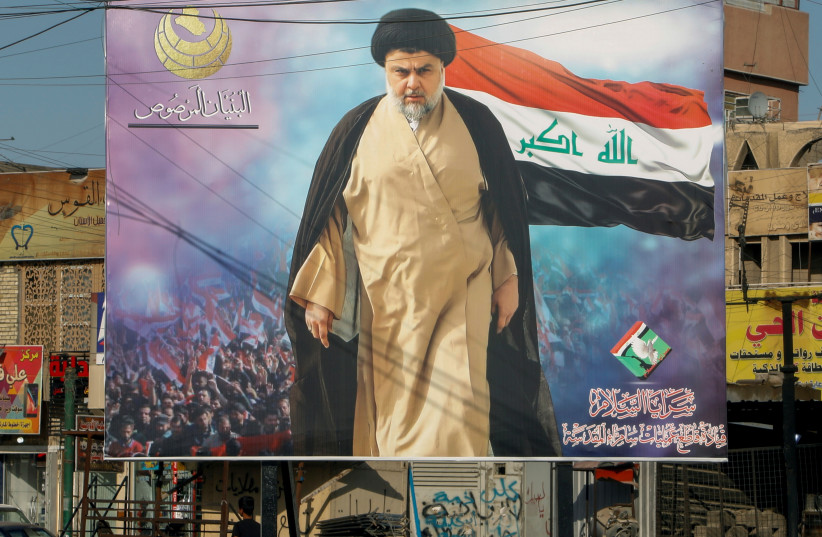Iraq is being plunged into chaos by mass protests that have taken over parliament. But it’s not clear whether this chaos is the fault of the protesters or the corrupt politicians, many of them backed by Iran, who have hollowed out and weakened their country and failed its people.
There are many different narratives in this respect. One argues that Muqtada al-Sadr and his supporters, who are protesting, are embarking on a kind of “coup.” But they might argue that it is the militias, many backed by Iran, that have crushed protesters for years and have essentially led a coup against the government.
There are other issues at stake. The Kurdistan Regional Government has a dispute with Baghdad over energy sales. The autonomous region has also been targeted by Iranian-backed militias and their rockets and drones. The militias have also targeted Iraqi Prime Minister Mustafa al-Kadhimi, as well as US and Turkish forces. Meanwhile, Turkish forces have increased their attacks on northern Iraq, killing tourists.

Another issue is whether Sadr is serious about reform or if he is merely a kind of populist who actually refuses to take power. The Shia scholar and militia leader acts like an outside protester, but he controls the largest number of parliamentarians in parliament. Instead of using them to form a coalition, he chooses to leave parliament and send protesters into the Green Zone.
Sadr this week said it was a “golden opportunity” to demand reform in Iraq.
“I hope the tragedy of missing the first golden opportunity in 2016 will not be repeated,” he said. “Yes, this is another opportunity to eliminate the darkness, corruption, exclusivity in power, loyalty to the outside, quotas and sectarianism that have dwelled in Iraq.”
“This is another opportunity to eliminate the darkness, corruption, exclusivity in power, loyalty to the outside, quotas and sectarianism that have dwelled in Iraq.”
Muqtada al-Sadr
The Kurdistan Region’s Rudaw Media Network reported: “At least 125 protesters, including security forces, were injured on Saturday when supporters of the influential cleric flocked into the parliament building.”
“Do not miss the opportunity, or else there will be a time of regret,” Sadr was quoted as saying. “Therefore, I call on everyone to support the revolutionaries for reform… not under my banner or my leadership, but under the banner of Iraq and the people’s decision.”
“The sit-in announced by protesters is in opposition to the nomination of Mohammed Shia’ al-Sudani, Iraq’s former minister of labor and social affairs, as a candidate for the country’s prime minister position by the Coordination Framework,” Rudaw reported. “Sudani is accused of corruption and having close ties to former PM Nouri al-Maliki.”
SO IS Sadr serious about reform? How should we read the current protests? They are not “anti-Iran,” the way some may want to believe they can be, but rather are part of a multi-year struggle by protesters.
It is true that pro-Iran militias have suppressed the protests. Tehran has bolstered the pro-Iran militias of Hashd al-Shaabi via weapons and political backing. In fact, Iran’s media stresses the “authority” of the Hashd. Therefore, Iran is also attempting a kind of reactionary coup.
The claims now in Iraq of a “coup” are therefore more of a rhetorical discussion. All sides want the government to be relatively weak. The autonomous Kurdistan Region prefers Baghdad not to meddle in its affairs. Iran wants to weaken Baghdad and take over state institutions to rob Iraq of resources and use it to threaten Israel.
Meanwhile, Turkey wants to be able to operate freely in its southern neighbor. Sadr had an opportunity to take power in Iraq with a coalition government, but he has refrained from doing so, meaning he wants a weak Iraq as well.
Therefore, the protesters are not really committing a coup, and there is no other power or institution in the beleaguered country that is capable of one. The pro-Iran militias are also divided and can’t hold power by themselves. Iraq’s army is not strong either.
All of this means Iraq’s overall trajectory is not toward a coup, but rather toward more weakening of the center, and there is no recipe to strengthen and stabilize the country. Large powers, such as neighbors Turkey and Iran, will therefore continue to use their vulnerable neighbor, which could cause more extremists to emerge or lead to more civil conflict.
